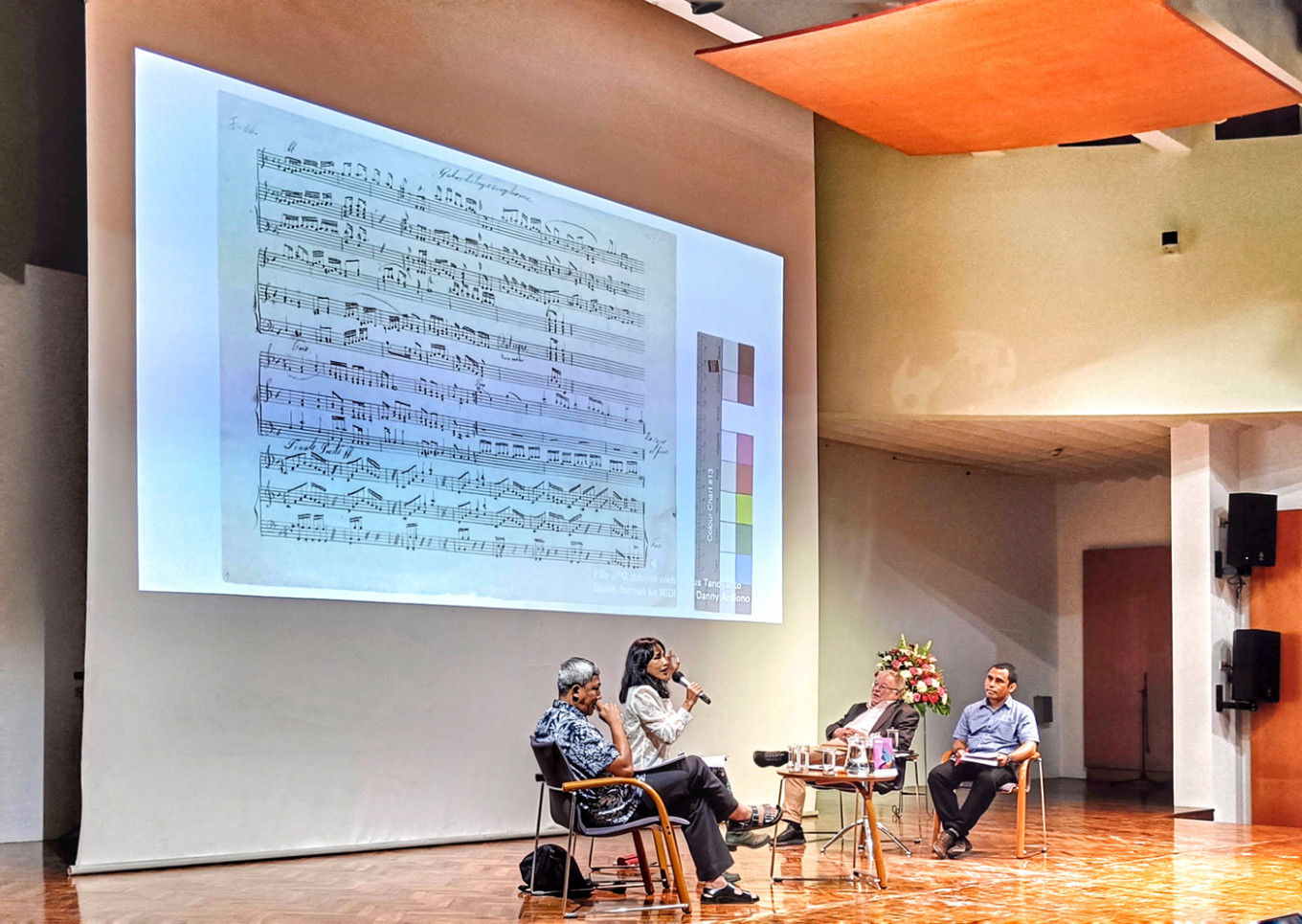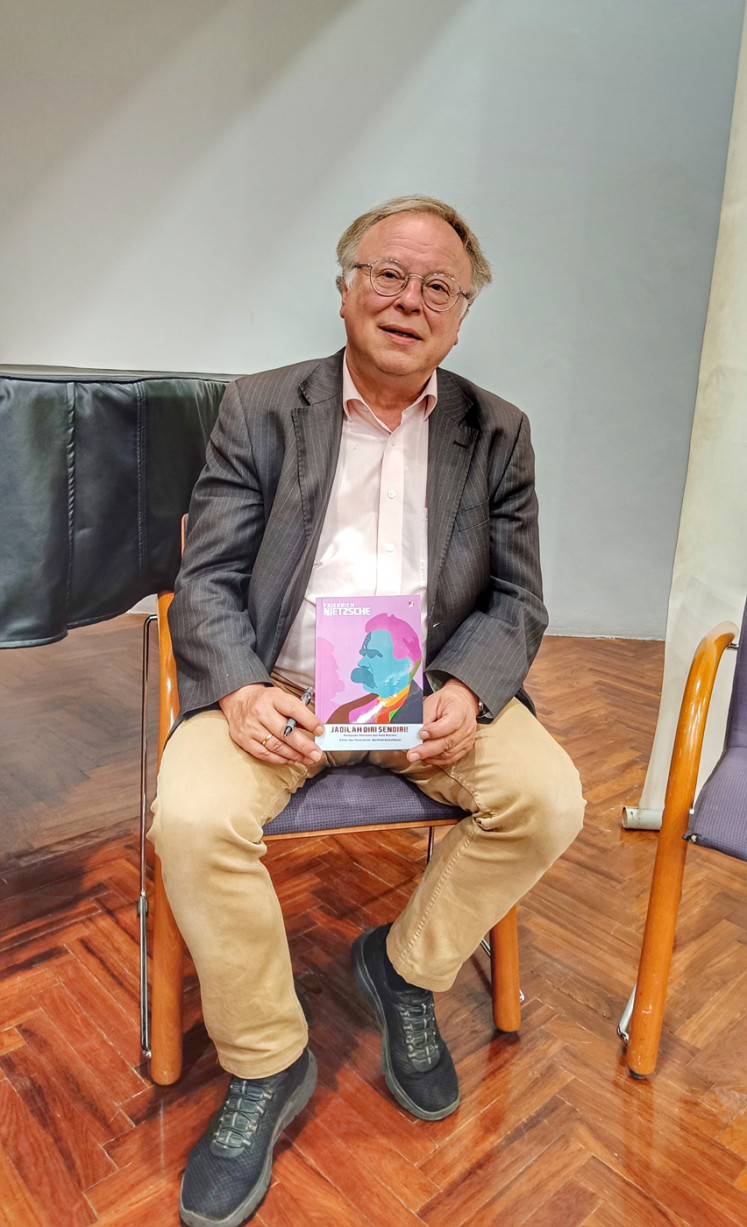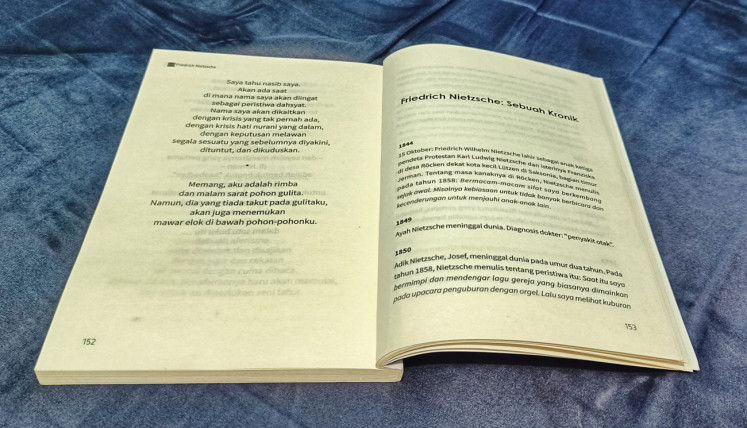Popular Reads
Top Results
Can't find what you're looking for?
View all search resultsPopular Reads
Top Results
Can't find what you're looking for?
View all search resultsNietzsche says ‘Be Yourself’ in latest compilation of aphorisms
Change text size
Gift Premium Articles
to Anyone
 Dive into the book: (From left to right) Dr. A. Setyo Wibowo, Ayu Utami, Berthold Damshauser and the moderator discuss the book at the Goethe Institute in Jakarta on Aug. 27. Displayed on the screen is an old musical piece, Geburtstag Symphonie, composed by Nietzsche. (JP/Sylviana Hamdani) (JP/Sylviana Hamdani)
Dive into the book: (From left to right) Dr. A. Setyo Wibowo, Ayu Utami, Berthold Damshauser and the moderator discuss the book at the Goethe Institute in Jakarta on Aug. 27. Displayed on the screen is an old musical piece, Geburtstag Symphonie, composed by Nietzsche. (JP/Sylviana Hamdani) (JP/Sylviana Hamdani)
G
erman professor Berthold Damshäuser has translated some of Friedrich Nietzsche’s most “nutritious” aphorisms into Indonesian and compiled them in a book.
“Be yourself” is perhaps one of the most repeated mantras of the 21st century. With this phrase, we seem to encourage one another to remain faithful to ourselves and our capacity in life without comparing ourselves to others.
Not any influencer nor any of today’s successful entrepreneurs came up with the motto. The phrase, originally sei du selbst (be yourself), was written by German philosopher Friedrich Wilhelm Nietzsche (1844-1900) in his book Schopenhauer als Erzieher (Schopenhauer as an Educator, 1874).
“It was derived from a long text by [Greek poet] Pindaros [also known as Pindar, 518-438 BC],” German professor Berthold Damshäuser said in fluent Indonesian during an interview with The Jakarta Post at the Goethe Institute in Jakarta on Aug. 27.
“Nietzsche seemed to have liked and repeated [the phrase] over and over again to describe [his concept of] übermensch [super-human].”
The professor, who teaches Indonesian language and literature at the University of Bonn, has compiled over 200 aphorisms by Nietzsche, translated into Indonesian and published in a book titled Jadilah Diri Sendiri! Kumpulan Aforisme dan Kata Mutiara Friedrich Nietzsche (Be Yourself! A Compilation of Aphorisms and Words of Wisdom by Friedrich Nietzsche).
The 172-page book was launched in Goethe Institute in Jakarta on Aug. 27.
“I believe that the book’s contents will nourish the soul and intellect of orang awam [laymen],” Damshäuser said.
Meet the author: Berthold Damshauser poses with his book titled 'Jadilah Diri Sendiri! Kumpulan Aforisme dan Kata Mutiara Friedrich Nietzsche' after an interview session. (JP/Sylviana Hamdani) (JP/Sylviana Hamdani)An 'Indonesianist'
“I have very different views from Nietzsche’s,” the professor said. “But it doesn’t bother me. Nietzsche has written so many enriching and thought-provoking aphorisms. It was a pleasure for me to be able to translate these beautiful texts from German into Indonesian.”
The 65-year-old is an expert in German-Indonesian and Indonesian-German translation and interpretation.
The professor fell in love with Indonesia while studying German literature and philosophy at the University of Bochum.
“It all happened by chance,” he said. “An Indonesian friend invited me to Indonesia. Then, I fell in love with the country and learned the language.”
Damshäuser was so infatuated with the country that he pursued a bachelor, master and doctoral degree in Indonesian language and literature at the University of Köln, the University of Bonn and the University of Indonesia between 1978 and 1984.
“I’m an Indonesianist,” he said with a proud smile.
He has taught Indonesian language and literature at the Institut für Orient und Asienwissenschaften (Institute for Orient and Asian Studies) at the University of Bonn since 1986.
Damshäuser was assigned to interpret for the former chancellor of Germany, Dr. Helmut Kohl, when he visited Indonesia in 1993.
In 1995, the professor was also assigned to interpret for former Indonesian president Soeharto when he visited Germany.
During his career, Damshäuser has translated and published over a dozen literature books from German to Indonesian and vice versa. Among his most important works is Sprachfeuer (Fire Tongue, 2015), an anthology of modern Indonesian poetries that he translated into German.
In 2015, he also authored a book titled Ini Dan Itu Indonesia (This and That Indonesia), which contains his views of the country.
The professor has always admired Friedrich Nietzsche for his life and his works.
“Nietzsche was not a coward at all,” he said. “He was sick almost all of his life and yet never complained. He accepted all the challenges in his life and faced them bravely.”
In the final chapter of his book Jadilah Diri Sendiri: Kumpulan Aforisme dan Kata Mutiara Friedrich Nietzsche, the professor also inscribed a brief biography of Nietzsche, including the years in which he suffered from debilitating migraines and depression. While suffering stoically, the philosopher penned another of his famous quotes, was mich nicht umbringt, macht mich stärker (what doesn’t kill me makes me stronger).
“It’s indeed a good teaching by Nietzsche, especially in this era in which many people feel that they’re victims in society,” the professor said.
Inside: A biography of Nietzsche (right-hand page) in the final chapter of the book. (JP/Sylviana Hamdani) (JP/Sylviana Hamdani)Translating in ambiguity
It took Damshäuser almost three years to compile Nietzsche’s aphorisms and translate them into Indonesian.
“I read more than ten books by Nietzsche and selected some of his most interesting quotes before translating them into Indonesian,” the father of two said.
According to the professor, the main difficulty in translating the quotes is the ambiguity of the Indonesian language.
“The Indonesian language is very ambiguous,” he said. “One word or phrase can mean a lot of things. It’s very challenging to choose the correct [word/phrase] when translating from German into Indonesian and conveying the right meaning.”
The absence of tenses in Indonesian also makes it harder to translate into the language.
The book is published by Diva Press, a publisher based in Yogyakarta.
“The compilation throws a new, interesting light on Nietzsche, especially as his aphorisms were translated by a German native, who is fluent in Indonesian,” Nisrina, representative of Diva Press, said during a WhatsApp interview on Sept. 16.
Previously, the publisher has also published two other books on Nietzsche, which is Syahwat Keabadian (Eternal Passion, 2020), a compilation of poetries by the German philosopher, compiled and translated by Damshäuser and Indonesian poet Agus R. Sarjono, and Zarathustra (2019), which was translated by Indonesian literary critic HB Jassin.
The first edition of Jadilah Diri Sendiri: Kumpulan Aforisme dan Kata Mutiara Friedrich Nietzsche is printed in 1,500 copies and is available in major bookstores and marketplaces for Rp 58,000.
Apt for social media
Indonesian author Ayu Utami appreciated the professor’s efforts in compiling Nietzsche’s aphorisms and translating them into Indonesian.
“I thank Pak [Mr.] Berthold for his work that has enriched the wealth of translated literature in Indonesia,” Ayu said during a discussion that followed the book launch in Goethe Institute Jakarta on Aug. 27.
“[Nietzsche’s] phrases are indeed beautiful,” Ayu said. “That’s perhaps because Nietzsche was not only a philosopher but also a poet and musical composer. [It’s] a fact that many of us often overlook.”
During the discussion, Ayu Utami also presented a musical composition by Nietzsche titled Geburtstag Symphonie (Birthday Symphony).
According to Ayu, readers can easily take one of Nietzsche’s beautiful aphorisms and upload them on social media to impress their followers.
“If you’re ever lacking any ideas to post on Twitter or Instagram, you can just refer to the book and choose some of the intelligent phrases there,” Ayu added with a significant smile.
Dr. A. Setyo Wibowo, a lecturer at Driyarkara School of Philosophy (STF Driyarkara), also approved the book during the discussion.
“Nietzsche’s [thinking] has never been easy to understand,” Setyo said. “Thus, I truly appreciate the translation of Nietzsche’s aphorisms by Berthold Damshäuser, a German fluent in Indonesian.”
For the next edition, the lecturer suggested that Damshäuser also include an interpretation for each of Nietzsche’s aphorisms in the book so that the phrases would not be “enigmatic sentences” that are difficult for laymen to digest.
But Damshäuser seems to disagree with him.
“Let’s forget who Nietzsche was, what he was trying to say, and just read the book,” Damshäuser said. “Read it carefully. Read it many times and immerse yourself in his sentences. Do you agree with them? Or do you disagree?”
“[Reading the book] can be the first step for you to learn to know and be yourself.”












